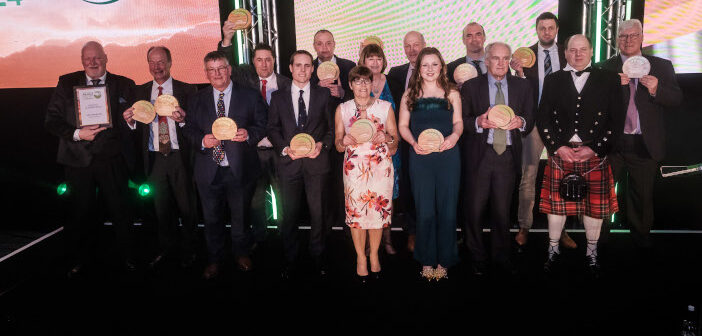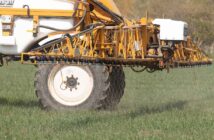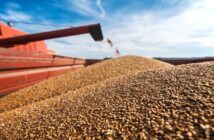Last night (the 7th of February) the industry came together to celebrate the very best working in agriculture at the National Arable and Grassland Awards (NAGA).
The event was held at the Hilton London Bankside hotel, where hundreds of guests enjoyed a three-course meal and entertainment from comedienne and TV star Lucy Porter. It was then time to celebrate the work of the farmers, contractors and agronomists who have excelled in their fields.
And the winners are…
Agronomist of the Year – sponsored by Sencrop
Ben Burrows was named Agronomist of the Year. Ben advises 28 diverse clients ranging from 150 acres to nearly 4,000 across a wide range of soil types including chalk downland, Cotswold brash, Denchworth clay and greensand.
He was nominated by Wheatsheaf Farming manager David Miller, the 2022 Sustainable Farming Award winner, due to his understanding of the business strategy to transition to regenerative crop production, something made easier by Ben’s experience and ability to embrace new thinking.
Ben goes much further than advising on agrochemicals, products and rates. He is proactive in suggesting alternative methods and developing strategies so that problems can be avoided rather than solved through firefighting tactics.
 This is now paying dividends for the Wheatsheaf business and other clients. As well as providing strategic advice throughout the season, he also helps oversee a range of field scale trials. This work is wide-ranging, but a particular focus has been on tailored nutrition. Great care has been taken to get accurate data on areas such as plant, tiller and ear counts, soil sampling and cover crop analysis.
This is now paying dividends for the Wheatsheaf business and other clients. As well as providing strategic advice throughout the season, he also helps oversee a range of field scale trials. This work is wide-ranging, but a particular focus has been on tailored nutrition. Great care has been taken to get accurate data on areas such as plant, tiller and ear counts, soil sampling and cover crop analysis.
Cereal Grower of the Year – sponsored by Secobra Research
Fife based arable farmer David Bell (J C Bell Ltd) was named Cereal Grower of the Year, boasting an impressive track record in winter and spring cereal yields. It’s a record that becomes more impressive when you consider that cereals aren’t the main cash crop, but potatoes for this mixed farm.
David has been a consistent YEN (Yield Enhancement Network) performer, regularly achieving both high yield and potential success. He has won gold and silver for winter barley yields of 14.3 t/ha and 14.1 t/ha respectively with field potential of over 100%.
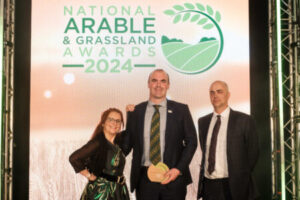 With a winter wheat and barley average of 11.0 t/ha and better David is certainly on top of his game.What’s been behind his success hasn’t been one significant ‘silver bullet’ change to the farming system but just attention to detail across the farming system. Small tweaks here and there to achieve incremental gains, and making the most of what he has.
With a winter wheat and barley average of 11.0 t/ha and better David is certainly on top of his game.What’s been behind his success hasn’t been one significant ‘silver bullet’ change to the farming system but just attention to detail across the farming system. Small tweaks here and there to achieve incremental gains, and making the most of what he has.
A varied rooting rotational strategy includes a range of cover crops, replacing what used to be done with metal. Combined with better variety selection it helps take the heat off pest and disease pressures. Cattle provide an ample supply of organic manures, as do straw for muck schemes and in some fields green manures are applied. Pasture provides a long-term break.
He has also made the move to precision ag with variable rate seed and nutrition proving highly effective. Extending field margins and adding multiple flower species provides yearlong beneficials habitats.
Contractor of the Year – sponsored by the Profitable Farming Company (PFC)
Martin Hays was named Contractor of the Year. For nearly three decades, he has offered grassland and arable operations across Derbyshire, servicing businesses of all sizes, from small livestock enterprises to 3,500-acre estates. Two full-time operators work alongside Martin, with self-employed labour brought in at peak periods.
A key motivation for Martin has been to consistently offer the best possible service for the 125 customers. This has led to substantial investment in precision farming systems, enabling even the smallest farms to benefit from accurate, environmentally conscious applications of manures and fertiliser.
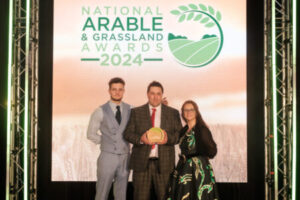 Martin states that ‘one disappointed customer is one too many’ and so focuses on maintaining workloads at a manageable level, this requires close communication with each customer – including planning out operations in advance. Where there are quiet months, Martin has diversified the business to include projects for the water and coal authorities and has recently invested in a new 14-tonne excavator to increase the level of winter work.
Martin states that ‘one disappointed customer is one too many’ and so focuses on maintaining workloads at a manageable level, this requires close communication with each customer – including planning out operations in advance. Where there are quiet months, Martin has diversified the business to include projects for the water and coal authorities and has recently invested in a new 14-tonne excavator to increase the level of winter work.
Farm Manager of the Year – sponsored by Househam Sprayers
Nottinghamshire-based Richard Cross was named Farm Manager of the Year. Described by Oxton Estate owner, James O’Donnell as the best asset the farm has, Richard has transformed a business into a diverse and thriving enterprise.
Numerous changes have been made to the way crops are managed. One of the most impactful was the early decision to repair damaged soils from extensive heavy cultivation. Soil type and topography are major handicaps.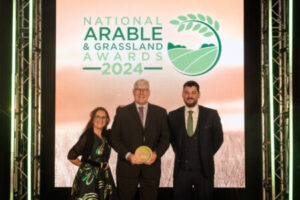
All machines are equipped with RTK guidance to minimise wasted passes and save time, inputs, and fuel. More importantly, yields have continued to build as soils recover – so much so that some exposed marginal fields have achieved 12t/ha.
Ahead of the curve applies to much else. Richard has embraced various digital technologies to gain greater insight and refine agronomic practice, particularly variable rate nutrition. He has also helped oversee several diversification initiatives. The most eye-catching is an early move into natural burials. It is now a significant venture employing its own staff – over the 12 years Richard has managed the estate more than 30,000 trees have been planted.
Fruit Grower of the Year
The M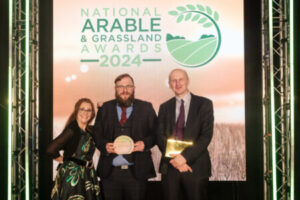 aidstone soft fruit producer Clock House Farm, headed up by Oli Pascall, was named Fruit Grower of the Year. Specialising in soft fruits, notably strawberries, raspberries and blackberries, as well as apples and plums across 300 acres, Clock House Farm has a significant market share in the UK, supplying major supermarkets as well as local farm shops.
aidstone soft fruit producer Clock House Farm, headed up by Oli Pascall, was named Fruit Grower of the Year. Specialising in soft fruits, notably strawberries, raspberries and blackberries, as well as apples and plums across 300 acres, Clock House Farm has a significant market share in the UK, supplying major supermarkets as well as local farm shops.
Most of the produce is grown in substrate in polytunnels, with 10% grown in heated glasshouses. Environmental sustainability is a focus for the business, with efforts made to improve biodiversity. The frequency of mowing has been reduced to boost the number of pollinators, while native species hedgerows and trees have been established and maintained. Clock House Farm has also used rewilding, with over nine hectares currently set aside as nature reserves.
£10 million has been invested in renewable energy, with heat sourced from the River Medway, reducing the carbon footprint of the business while also extending the growing season. A biomass boiler and solar panels have also been integrated. As for water management, drip irrigation systems with Priva moisture analysis are fed by three reservoirs, with water treated for contaminants before being used.
Robotics also play a role, with 40 hectares of strawberries undergoing autonomous UV-C treatment – said to be the first large scale trial of this kind. This has significantly reduced the amount of chemicals required to treat mildew, as well as improving the carbon footprint due to the use of electric motors in the robots.
Recently the company established Linton Growing, a containerised crop propagation business, to provide access to high quality plant stock – an example of vertical integration that offers direct procurement of plants.
Oli Pascall was unable to attend the event. The Fruit Grower of the Year award was collected on his behalf by Farm Contractor & Large Scale Farmer editor Matthew Tilt.
Grassland Manager of the Year – sponsored by OMEX
Working out of South Lanarkshire, JP Baird was named Grassland Manager of the Year. Averaging around 14 tonnes per hectare of grass grown, the family partnership of Andrew and Marisa Baird, along with their newly married daughter Kirstie Morrison, rear the 200-head Norwegian Red/Black and White crosses herd yielding around 8,040 litres per cow, per year, with half of the total yield coming from forage – with the business boasting 100% grass utilisation.

Robotic milking has been integrated into the system. Using a block grazing system, cows receive three fills of fresh grass every day, with outdoor grazing starting at the beginning of April. No chemicals are used on the grazing or silage ground, instead pre-mowing is done to keep weed numbers under control, as well as to maintain grass quality later in the season when the crop is coming to a head.
High sugar tetraploids are established alongside ryegrass, fescues and white clover, with a focus on varieties that will persist through a 21-day rotation. Organic manures are used to top up nutrients, with a dribble bar preferred over a trailing shoe due to the wider working width.
The farm avoids ploughing and reseeding unless performance drops, with some of the highest-performing leys being well over 10 years old. To measure grass performance, the family uses the
GrassCheckGB system, the data from which has helped them increase yields while also reducing the reliance on ar
tificial fertilisers.
Lifetime Achievement Award
Devoting his life to improving policy in agriculture, Martin Howarth was presented with the Lifetime Achievement Award.
Having spent time working at the European Commission, Martin joined the NFU’s economic department in 1980, working his way up to the head of the organisation’s Brussels office between 1983 and 1986.
Since then 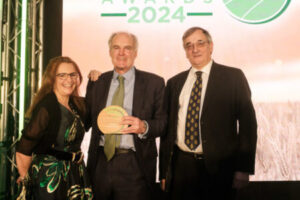 he has worked tirelessly across multiple roles, including head of international affairs at the NFU, where he was responsible for co-ordinating policy across Europe, as well as trade issues and liaisons with international contacts. In 1999, he was appointed director of policy at the NFU and went on to be acting director general.
he has worked tirelessly across multiple roles, including head of international affairs at the NFU, where he was responsible for co-ordinating policy across Europe, as well as trade issues and liaisons with international contacts. In 1999, he was appointed director of policy at the NFU and went on to be acting director general.
Outside of the NFU, he has continued to work to improve policy for farmers, working as part of the World Farmers Organisation, including as director of strategy following the EU referendum.
Oilseed Grower of the Year – sponsored by Premium Crops – and Grower of the Year
Farming across South Wales, Richard and Lyn Anthony were named Oilseed Grower of the Year, as well as the overall Grower of the Year.
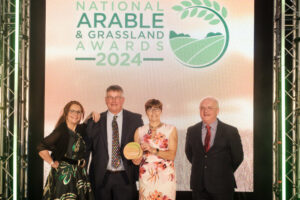 The strap line beneath the R&L Anthony logo reads ‘innovative farming’ and that is apt given the progress of this farming enterprise. The husband-and-wife team have turned what started as a 45ha tenanted farm into a diverse, sustainable and successful enterprise – all in the space of less than 25 years.
The strap line beneath the R&L Anthony logo reads ‘innovative farming’ and that is apt given the progress of this farming enterprise. The husband-and-wife team have turned what started as a 45ha tenanted farm into a diverse, sustainable and successful enterprise – all in the space of less than 25 years.
That is a remarkable achievement especially as it has come whilst enhancing the local environment too. The Anthonys’ have always had a passion for conservation so wildlife corridors, bird, pollen and nectar strips are part of the farming landscape, which they make work for their farming system too.
No-till, cover and companion cropping, livestock integration and digestate are all employed. Following experimentation with various companion crops for winter oilseed, buckwheat, vetch and spring beans are now drilled alongside with an adapted Mzuri drill that allows three crops to be established in one pass.
It helps reduce CSF beetle damage. The vetch and beans also fix nitrogen and the buckwheat mines phosphate and releases the phosphate in a form suitable for the roots to absorb. Digestate is also applied to supply nutrients to the OSR plants and deter flea beetle attack. Hybrids like Ambassador and D K Exsteel chosen for their vigour.
As soils have become more moisture-retentive with greater overall resilience, so arable yields have increased. The 5-year yield average is 4.7 t/ha.
But the Anthony’s are never complacent when it comes to refining further their connected farming system. Always open to new thinking they have made the most of hosting on-farm trials for industry partners such as Agrii and NIAB. The business is also part of the AHDB monitor farms initiative.
They are part of Agrii’s Green Horizon initiative. The Anthony’s have cut inorganic fertiliser emissions to just 2%, way below the 25% arable farm average and the farm typically sequesters around 60,000 tonnes of carbon a year.
Potato Grower of the Year – sponsored by FMC
David Armstrong, who farms in Lincolnshire, picked up the award for Potato Grower of the Year. The bulk of the potato crop for David Armstrong Farms is Maris Piper, with around 1,500 tonnes of packing-grade produce delivered to Branston Ltd each year. A key indicator of the company’s performance – according to David– is the weight loss reduction they see each year, which was just 3% last season and 2% the year prior.
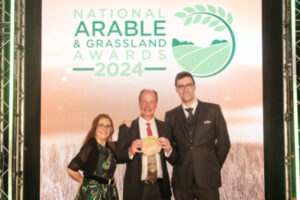 Being a supplier to Branston also provides a general benchmarking system, and the business was named Branston’s Lincoln Grower of the Year. The success is partly down to the long rotation, with no less than ten years between potato crops. Fields are tested for potato cyst nematode, with cropping plans being changed if more than 10 eggs per gram are found in any area. If potatoes are planted, they go in after a cover crop which helps to sure up the soil structure and limit erosion.
Being a supplier to Branston also provides a general benchmarking system, and the business was named Branston’s Lincoln Grower of the Year. The success is partly down to the long rotation, with no less than ten years between potato crops. Fields are tested for potato cyst nematode, with cropping plans being changed if more than 10 eggs per gram are found in any area. If potatoes are planted, they go in after a cover crop which helps to sure up the soil structure and limit erosion.
The full potato area is drip irrigated, which has helped to control common scab in the Maris Piper and reduces the risk of blight as the canopy is not wetted. To limit aphid pressure, pollinator mixes are established on the headlands.
Protein Crop Grower of the Year – sponsored by Limagrain
As a Norfolk boy, David Wroth knows the value of the centuries-old Norfolk four-course system. Now, he has been named Protein Crop Grower of the Year.
He has always tried to incorporate them into cover crops and now has extended the rotation to 6 years. With light, sandy soils, he grows crops in a manner that protects the environment from leaching and wind erosion, an area also exposed to some ‘unique’ weather being close to The Wash.
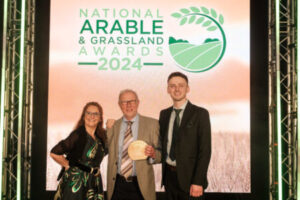 It was a request from Limagrain to grow the large blue pea variety Aviator that led to David including peas in the rotation. The crop performed well and now the acreage has increased substantially. What has been behind the success is exceptional attention to detail. With light soils and low annual rainfall, the trick is to get them off to a good start.
It was a request from Limagrain to grow the large blue pea variety Aviator that led to David including peas in the rotation. The crop performed well and now the acreage has increased substantially. What has been behind the success is exceptional attention to detail. With light soils and low annual rainfall, the trick is to get them off to a good start.
David won’t rush into drilling, he’ll wait until soil temperatures are right, having the kit ‘ready to go’ is essential to make the most of the right day. They’re drilled deep to get as much moisture as they can and if no rain is forecast a 12m set of rolls will go over. Trials with seed treatments have also proved useful in getting crops away.
He’s also making peas work as part of the rotation. Their nitrogen-capturing properties are a ‘no-brainer’ with high fertiliser prices. A relatively cheap spring crop that puts up to 30 kgs of free nitrogen back in the ground.
David Wroth was unable to attend the event. The Fruit Grower of the Year award was collected on his behalf by Agronomist & Arable Farmer editor Richard Laurence.
Sustainable Farming Award – sponsored by QLF Agronomy
Based just outside of Peterborough, Mee Farmers took home the Sustainable Farming Award. A family-run business, with Peter and Zoe Mee, their children Charlie and Emily, and Charlie’s fiancée Charlotte, all involved in the day-to-day operations, Mee Farmers is a 700-acre farm with both an arable rotation and a horticulture enterprise.
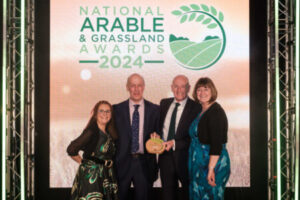 To offset the environmental impact of the business, 70,000kw of solar panels have been installed on grain store roofs and a ground source heat pump for the farmhouse, with the family also investigating the viability of a wind turbine. For the arable side of the business, regenerative farming techniques have been implemented to limit passes and the crop rotation has been extended to include cover crops. Artificial fertiliser usage has been reduced, and replaced with an on-farm compost made up of locally sourced chicken litter, spent hops and woodchip.
To offset the environmental impact of the business, 70,000kw of solar panels have been installed on grain store roofs and a ground source heat pump for the farmhouse, with the family also investigating the viability of a wind turbine. For the arable side of the business, regenerative farming techniques have been implemented to limit passes and the crop rotation has been extended to include cover crops. Artificial fertiliser usage has been reduced, and replaced with an on-farm compost made up of locally sourced chicken litter, spent hops and woodchip.
Over 6,800 hedgerow plants have been planted, to create wildlife corridors across the farm and unproductive land has been sown with wild bird seed mixes and cover crops to encourage wildlife. Mee Farmers has also invested in rainwater harvesting and trickle irrigation systems for water conservation.
Recyclable waste is put through a baler, making it easier to ensure that it goes to the correct endpoint. Food waste from the horticulture side is split with the ripest fruit used in their food and drink product line, and fruit not fit for human consumption goes to a local pig farmer.
Vegetable Grower of the Year
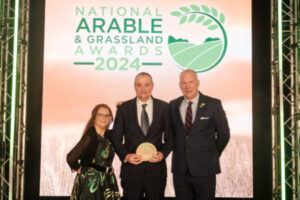 Jason Smith, of Home Farm Nacton, was named as Vegetable Grower of the Year. Producing both organic and conventional crops, Home Farm Nacton comprises 1,940 hectares of light soil on the Suffolk coast. Both the conventional and organic ground are set out in six-year rotations, with close attention to building organic matter with cover crops and soil amendments, as well as constantly assessing and adjusting cultivation methods to prevent erosion.
Jason Smith, of Home Farm Nacton, was named as Vegetable Grower of the Year. Producing both organic and conventional crops, Home Farm Nacton comprises 1,940 hectares of light soil on the Suffolk coast. Both the conventional and organic ground are set out in six-year rotations, with close attention to building organic matter with cover crops and soil amendments, as well as constantly assessing and adjusting cultivation methods to prevent erosion.
The business continues to look at new developments coming onto the market and in the last few years has invested in two autonomous machines. The first is the Robotti, with a three-point linkage to mount traditional implements on, while the other is the FarmDroid sowing and mechanical weeding robot. Both investments have enabled the company to tackle a shortage of skilled labour and ensure that the jobs ‘no one wants to do’ are still done.
Working with four landowners along the Felixstowe peninsula, Home Farm Nacton has also been involved in a significant project to improve water management. Felixstowe Hydrocycle received an EU grant to establish a pipeline to divert fresh water into farm reservoirs, instead of into the sea. In addition to this, the business has trialled the use of managed aquifer recharge to store water in the crag, reducing the need for additional large-scale reservoirs that take up productive ground.
Young Agronomist of the Year – sponsored by UPL
Todd Jex, who works for Agrii, was named Young Agronomist of the Year. Within two years of starting out on his agronomy career, Todd formed the 15t Farm Discussion Group and he has been on the ‘front foot’ ever since.
A mindset of always learning was instilled in him by his grandfather who told the young Todd ‘the day you stop learning is the day you get left behind.’
In his view, agronomy requires a comprehensive knowledge with it being such a multidiscipline and multifaceted topic. Since the start of his career, he has continually worked to build his knowledge. He holds various BASIS and FACTs diplomas including a Diploma in Agronomy as well as the Harper Adams Graduate Diploma.
In addition, he is a proactive member of various benchmarking groups, organises numerous trials, developed a bespoke soil health measuring, monitoring and reporting system, is a mentor for trainees and happy to evaluate new technology as it comes along.
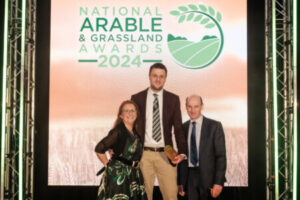 With a managed area of just under 10,000ha, Todd is bringing all that to bear in the field to help his clients de-risk their businesses. He was an early adopter of precision techniques and regenerative practices, now 60% of his customers are now no-till and are employing a regenerative type system. With the focus on profit many are benefitting from integrated crop managementstrategies, reducing costly synthetic inputs.
With a managed area of just under 10,000ha, Todd is bringing all that to bear in the field to help his clients de-risk their businesses. He was an early adopter of precision techniques and regenerative practices, now 60% of his customers are now no-till and are employing a regenerative type system. With the focus on profit many are benefitting from integrated crop managementstrategies, reducing costly synthetic inputs.
One is D W Taylor & Sons Ltd of Blandford, Dorset. In their words, Todd ‘Dragged them into the modern age’. Intending to preserve yield whilst reducing costs, the Taylors wanted to move to a more regenerative system and Todd was on the ‘front foot’ from the start and it gave the Taylors the confidence to undertake the numerous challenges they have made.
Young Farmer of the Year
Hayley Graham, who worked with the Lincolnshire-based David Armstrong Farms (named Potato Grower of the Year at the same event) was named Young Farmer of the Year. When Hayley started work at David Armstrong

Farms, she had no prior agricultural experience but according to David Armstrong she had the right attitude. Over her five years with the firm, she completed a Foundation Degree in Agriculture at the University of Lincoln, while also progressing through the business – gradually taking on more complicated operations.
In her first year, Hayley was primarily on corn carting and rolling, as well as drain jetting in the winter. Since then, she has completed PA1, PA2, PA4 S & G, Forklift, Teleporter, Category H and BASIS Foundation qualifications.
In 2020, when the lead arable operator left the business, Hayley jumped at the opportunity to take on more responsibilities, and with training and guidance from David became the farm’s lead sprayer operator. By 2022, she was the farm’s main operator, adding potato planting and harvesting to her workload, and last year she also jumped into the combine cabin for the first time.
Keen to broaden her knowledge, Hayley worked in Wales for two weeks during lambing and has since established her own flock of sheep, which has grown to 49 breeding ewes, with 82 lambs added to the flock last year. She is currently in New Zealand working for a grassland contractor, expanding her knowledge once again.
Hayley Graham was unable to attend the ceremony. Her award was collected on her behalf by David Armstrong Farms.
There was also a special award of recognition given to NAAC chairman and contractor James Bannister. Chief executive of the NAAC, Jill Hewett, explained that James had continued to work tirelessly within the industry despite suffering a life-changing injury.
His work both as a contractor and as an advocate for health and safety within the industry was highlighted at the event and James uses his story as both a warning of the dangers within agriculture and proof that an injury does not have to stop you from doing what you love.
NAGA is organised by Farm Contractor & Large Scale Farmer and Agronomist & Arable Farmer, in association with the National Association of Agricultural Contractors (NAAC) and BASIS. The awards are in their third year and are sponsored by key companies within the industry.
The Farming Community Network
During the National Arable and Grassland Awards, we raised money for The Farming Community Network (FCN), a voluntary organisation and charity that aims to improve the health and well-being of people in farming.
 Community Network (FCN), a voluntary organisation and charity that aims to improve the health and well-being of people in farming.
Community Network (FCN), a voluntary organisation and charity that aims to improve the health and well-being of people in farming.
FCN has a wide network of volunteers, located throughout England and Wales, many of whom are involved in farming, or have close li
nks with agriculture and therefore have a great understanding of the issues farm workers and farming families regularly face. The volunteers provide free and confidential support to anyone who seeks help, regardless of whether the issue is personal or business-related. You can learn more about volunteering with FCN here: fcn.org.uk/volunteering
In addition to local groups of volunteers, FCN runs a confidential national helpline (03000 111 999, open 7am-11pm every day of the year) and e-helpline (help@fcn.org.uk).
FCN relies solely on donations and grants. If you are attending the National Arable and Grassland Awards, there will be opportunities to donate throughout the night. If you would like to donate beforehand, or if you are not attending but would like to support this worthwhile cause, use the QR code on this page to donate.
To find out more about the Farming Community Network or to donate go to www.fcn.org.uk
For more information on the National Arable and Grassland Awards go to www.nationalarableandgrasslandawards.co.uk

